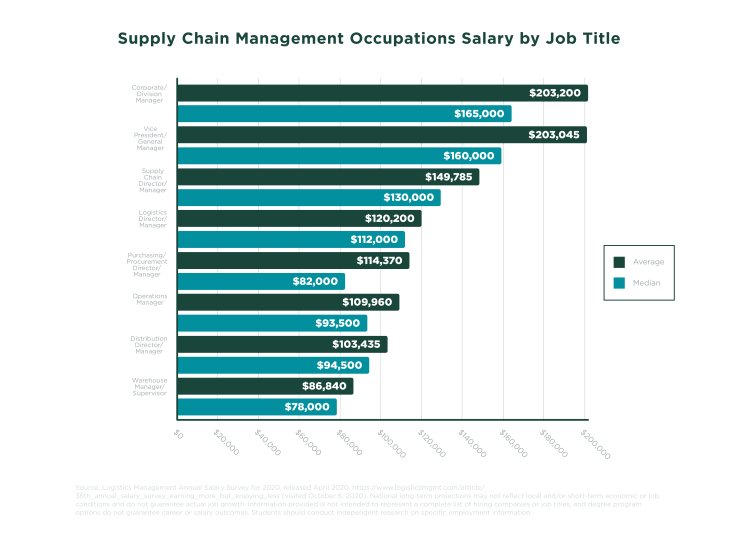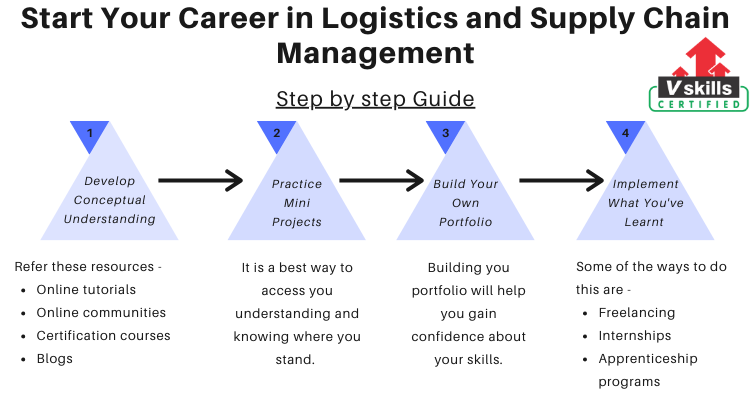Logistics & Supply Chain Management is considered as one of the most powerful source of competitive advantage in recent times. It attempts to enhance the traditional management by focusing on the organization and integration amongst the various partners of supply chain for better management and thus providing greater value to the consumer. Getting started in this field can be a huge push to your career.
Let us look at the career prospects of Logistics and Supply Chain Management!
What is Logistics and Supply Chain Management?
Supply chain management encompasses the planning and management of all activities involved in sourcing and procurement, conversion, and all logistics management activities. Logistics management is that part of supply chain management that plans, implements, and controls the efficient, effective forward and reverses flow and storage of goods, services and related information between the point of origin and the point of consumption in order to meet customers’ requirements.
Why to choose a career in Logistics and Supply Chain Management?
Some of the reasons to choose Career in Logistics and Supply Chain Management are –
- Logistics and supply chain management have become increasingly relevant. Goods must be procured, packaged, and dispatched in every industry. In today’s business world, efficient and effective management of all of these business functions is crucial.
- In the job market, someone with a deep and integrated understanding of logistics is a good candidate. Graduates have a huge advantage in terms of job prospects. A supply chain is present in every retail company, so this is an environment where there are numerous job opportunities.
- Great order deliveries, customer responsiveness, and cost efficiency are main strategic goals in the retail sector. It’s no wonder, then, that logistics and supply chain management are vital competencies for meeting consumer demand in a timely and cost-effective manner.
What skills do I need?
People with inquisitiveness and a willingness to understand patterns and trends within data are especially employable. Simulation, modelling, forecasting, problem solving, and negotiating skills, as well as the ability to think on your feet under pressure, are extremely useful. It’s also important to be able to respond calmly and thoughtfully to new situations.
Successful candidates must be able to comprehend the highly nuanced technological dimensions of supply chains and communicate them clearly and succinctly to non-technical colleagues and customers. Graduates who grew up in the internet age would be well-positioned to comprehend the complexities of the internet.
How Can you start your career in Logistics and Supply Chain Management?
To be acceptable at something, it is critical to have a good start with appropriate assets and learning material. As a result, your first steps toward learning must be appropriate in order for you to be a pro in this field. Let’s take a look at some steps you can take to start your learning process –
Step 1 – Learn about the basics and Develop Conceptual understanding
Before being an expert in any area, it is important to have a strong base. You must have sufficient applied knowledge even before you get your hands on the practical labs. It is necessary for everyone to begin somewhere. You must begin small if you want to have a good career in this area. You can get full information and a complete conceptual understanding by using the tools mentioned below –
- Firstly, Online Tutorials for Logistics and Supply Chain Management
- Also, Certification Courses from verified sources such as Vskills, Coursera, Udemy and so on.
- In addition, Online communities
- Moreover, Blogs and study material from experts in this field and many more.
Vskills also provide Online tutorials, certification courses and free practice tests for the same. You can check them out on our official site.
Step 2 – Practice Mini Projects
You must practice if you want to be good. It’s also the most effective way to access one’s understanding and know where you’re headed in terms of putting what you’ve learned into practice. Getting some experience in practical aspects such as applying Logistics and Supply Chain Management in projects will help you stand out from the crowd.
You can supplement your learning with the help of reading the blogs and tutorials by various sites which will help you to grasp a better understanding of the practical aspects.
Step 3 – Build Your Portfolio
Building your portfolio will help you gain trust in your abilities while also providing a forum for learning. Your portfolio reflects your ability to execute and schedule various logics, as well as how well you do in the areas of Logistics and Supply Chain Management. These responsibilities should include a variety of data sets and encourage readers to learn a lot.
Step 4 – Implement your skills in Real world
Execution of the ability you’ve mastered is vital because that’s why you learned in the first place – to perfect the skill! You must also remain up to date with latest technical developments and continue to work and improve your own skills. Any of the technical courses can also be used to show that you have a comprehensive understanding of advanced skills. You can put your talents to use in a variety of ways, including:
- Freelancing
- Internships
- Apprenticeship programs
Above mentioned steps will help you to get started in this domain. However, there is a long way to go. You can take up an advanced course to take your skills to a new level.
Career opportunities in Logistics and Supply Chain Management
Some of the roles at which you will be working are –
Supply Chain Planner: A management role responsible for assessing supply chain efficiency and implementing development strategies.
Demand Planner: This role entails predicting and anticipating potential demand for a company’s goods, as well as collaborating with various supply chain functions to satisfy the demand while avoiding oversupply.
Supply chain finance management: It is similar to other corporate finance activities, but it focuses on supply chain cost control. This is a work that is usually only found in larger companies.
supply chain IT: Larger businesses also have these divisions that provide and manage technology for supply chain functions. Some companies have IT departments devoted solely to the logistics role.
Sales roles: Ocean, air, and overland airlines, as well as 3PLs and 4PLs, all sell logistics services to help customers with their supply chain operations. That means they’re all in the business of selling something. Since you must consider your customers’ supply chains and the role your employer plays in supporting them, a sales role in a logistics service company will introduce you to any aspect of supply chain operation and management.
Supply Chain Consulting: If you enjoy a wide range of experiences, you might want to consider joining a supply chain and logistics consulting company. Working as a consultant will subject you to hundreds of different ventures for a number of companies. However, prior to taking a consultancy job, it is a good idea (though not required) to obtain some experience working in supply chain management.
Market Demand
According to Fortune and Materials Handling Institute Supply Chain Management positions will grow at nearly 270,000 opportunities per year There is greater demand for Supply Chain professionals than supply There are exciting career opportunities as a Logistics Manager, Supply Chain Analyst, Purchasing Manager. Candidates in Logistics and SCM will get employment in companies like DHL, TNT, Mahindra Logistics, Gati KWE Pvt Ltd, Flipkart, Snapdeal etc.
If you want to work in logistics or supply chain management, you must be devoted to professional development. You’ll be expected to develop your knowledge and skills throughout your career by attending training classes, speaking at conferences, and networking events.
Membership in a professional association, such as the CIPS or the CILT, is beneficial and shows dedication to the field. Membership also gives you access to a variety of technical credentials and training courses that will help you keep up with your continuing education.
Average Salary
As these new opportunities arise and the position of supply chain and logistics becomes increasingly important, the demand for top talent to serve as strategic leaders is likely to rise, resulting in competitive salaries, especially at the manager level and higher.

According to ASCM’s 2020 Supply Chain Salary and Career Survey Study, supply chain wages have a bright future. According to the ASCM Survey Study, supply chain practitioners with at least a bachelor’s degree earn a median salary of $78,750. It’s a statistic that’s 24% higher than the national median wage.
If you move up the supply chain career ladder, your earning capacity increases, with six-figure salaries not uncommon for those in management or higher positions. Although supply chain wages are still competitive, incentives, profit sharing, and other types of additional cash compensation are the standard, with 91 percent of respondents to ASCM’s Survey Report saying they earned some sort of bonus, profit sharing, or other form of additional cash compensation.
Future Trends
Gaining experience, qualifications, and technical certifications can all affect salary, so continuing your education as you progress in your career can add up. According to the ASCM Survey Report, supply chain practitioners with a master’s degree or higher received a median salary of $95,750. Finally, if you need a certificate program or a degree program, your experience and career goals will help you decide the best program for your supply chain management career.
Supply chain management is a field poised to develop and change, with a range of fields and specialties in which to pursue a career, higher-than-average wages, and opportunities for promotion and career development.
Get started and discover the career opportunities in the field of Logistics and Supply Chain Management. Hurry up and try free practice tests now offered by Vskills.in!






